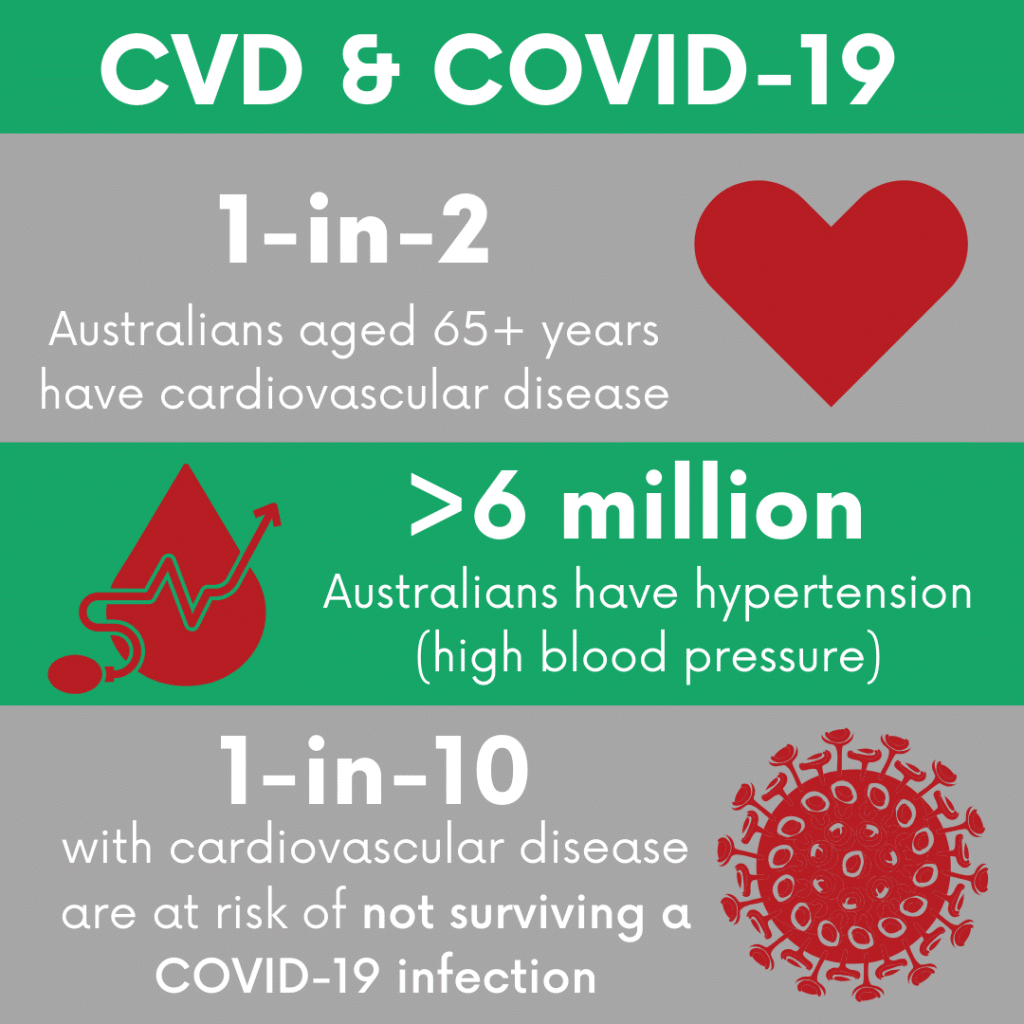Aussies with CVD at higher risk from COVID-19
Tracking the incidence of COVID-19 globally, it is understood that people over the age of 60 with a pre-existing chronic condition, such as cardiovascular disease (CVD) or diabetes, are considered at greater risk to serious infection and complications.1
There has been a high prevalence of CVD in those dying from COVID-19 in Italy and China, two of the worst affected countries initially. In fact, one-third of Italian and 1-in-10 Chinese patients who died from COVID-19 had pre-existing heart disease, such as hypertension (high blood pressure) or atrial fibrillation (abnormal heart rhythm).2
So, what’s the link?
According to GenesisCare Executive Manager of Cardiology and Interventional Cardiologist, Professor Steve Worthley, Sydney, while the COVID-19 virus itself doesn’t directly affect the heart, it can cause problems with breathing and breathlessness, which can place significant stress on the heart.
“Individuals with CVD seem to be at higher risk of serious COVID-19 infection, particularly those over the age of 60, which is why we have seen deaths related to cardiac complications in some people infected with the virus. This is particularly concerning, given the high rate of CVD in Australia,” said Prof Worthley.
“We want to alert Australians, not alarm them. By informing Australians over 60 to the possible risk-factors, we are hoping to help safeguard them against this devastating virus,” Prof Worthley said.

According to Prof Worthley, being vigilant about their health will ensure Australians with CVD are better protected during this time. Here is his expert advice:
1. Speak to your healthcare professional and update your CVD health plan
Utilise online and telehealth services (video conference calls) where available to limit the risk of contact during COVID-19.
2. Speak to your local regular pharmacist about your medication
New temporary measures are allowing pharmacists to give patients up to one month’s supply of their usual medicine without a script, under strict conditions, and at home delivery for PBS medicines is also now available.
For more information about accessing prescription medications, visit the Department of Health website.
3. Make sure your routine vaccines are up to date, especially as flu season approaches
While there is currently only a vaccine for the flu, not for COVID-19, getting the flu and COVID-19 at the same time can make you very ill. Get your flu shot from your GP or pharmacist today.
4. Ensure you and your family practice good hygiene
Wash your hands often with soap and water, use a tissue and cover your mouth when you cough or sneeze and avoid touching your face and mouth.
5. Following the social distancing rules as detailed by the department of health
Stay home unless:
- You’re an essential worker;
- Shopping for food;
- Exercising in a public space such as a park (max. 2 people);
- You have a medical appointment or are visiting a pharmacy; or
- You are providing care to another person outside your home.
If you must go out, remember to:
- Keep 1.5 metres away from others;
- Avoid physical greetings such as handshaking, hugs and kisses;
- Use tap and go instead of cash; and
- Travel at quiet times and avoid crowds.
Should you have any questions about CVD during COVID-19, contact your healthcare professional or call the National Coronavirus Health Information Line on 1800 020 080.
References
1. HealthDirect. COVID-19 information for older Australians. 2020. [April 2020]; Available from: https://www.healthdirect.gov.au/coronavirus-covid-19-information-for-older-australians-faqs.
2. Centre for Evidence-Based Medicine. Global Covid-19 Case Fatality Rates. 2020. [April 2020]; Available from: https://www.cebm.net/covid-19/global-covid-19-case-fatality-rates/.
3. Heart Foundation. Cardiovascular disease fact sheet. [April 2020]; Available from: https://www.heartfoundation.org.au/about-us/what-we-do/heart-disease-in-australia/cardiovascular-disease-fact-sheet.
4. Australian Bureau of Statistics. National Health Survey: First Results, 2017-2018. 2019. [April 2020]; Available from: https://www.abs.gov.au/AUSSTATS/abs@.nsf/DetailsPage/4364.0.55.0012017-18?OpenDocument.
5. Heart Foundation. Get the facts on hypertension. [April 2020]; Available from: https://www.heartfoundation.org.au/images/uploads/main/HeartWeek_fact_sheet_for_professionals.pdf.
6. Heart Foundation. Australia’s hidden heart epidemic taking more lives each year. 2019. [April 2020]; Available from: https://www.heartfoundation.org.au/news/australias-hidden-heart-epidemic-taking-more-lives-each-year.
